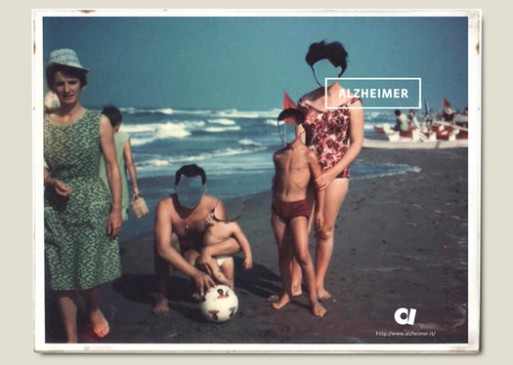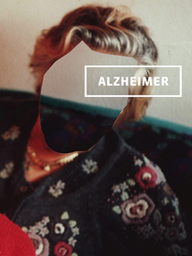Alzheimer’s disease has become one of the most prevalent forms of advanced dementia in America. According to the National Institute on Aging (NIA), the degenerative brain disease currently affects close to 5.1 Americans. It is a highly distressing statistic and something that graphic designer Domenico Liberti wants more people to be aware of.
The Italy-based Liberti has developed a smart Alzheimer’s awareness campaign, through which he hopes to inform others of the advanced dementia and memory distortions that define the disease. All of Liberti’s ads feature vintage photographs of families spending quality time together – on the beach, or perhaps celebrating a holiday – but the faces of some members are removed completely.
One of the most frightening aspects of Alzheimer’s is that it appears to take the life of an aging loved one before they have even passed; it distorts their normal behavior and memory so that they run the risk of losing the identity that’s defined them their entire life. This painful reality is brought to the forefront of Liberti’s “faceless” campaign, causing viewers to consider those who may be at risk in their own family today, or in the future.
“One of the most frightening aspects of Alzheimer’s is that it appears to take the life of an aging loved one before they have even passed; it distorts their normal behavior and memory so that they run the risk of losing the identity that’s defined them their entire life”
Though the causes of Alzheimer’s are unclear, the disease can be traced as far back as 1906. Dr. Alois Alzheimer had discovered abnormal clumps in a woman’s brain tissue after she had passed away, stating that they must have resulted from “an unusual mental illness.” The woman’s symptoms included impaired memory, difficulty speaking and uncharacteristic behavior – all signs of the disease that would soon take its namesake from Dr. Alzheimer.
“It is likely that the causes [of the advanced dementia] include some mix of genetic, environmental and lifestyle factors,” explains the NIA, “[but] people differ in their genetic make-up and lifestyle. The importance of any one of these factors in increasing or decreasing the risk of developing Alzheimer’s may differ from person to person.”
View more of Liberti’s campaign here.
Related SevenPonds Articles:
- 10 Ways You Can Help a Loved One With Alzheimer’s Survive Hospitalization
- Love, Loss, and Laughter: Seeing Alzheimer’s Differently
- What is Restorative Art? – An Interview with Beth Corwin

 New Awareness Campaign for Alzheimer’s Brain Disease
New Awareness Campaign for Alzheimer’s Brain Disease





 How to Comfort A Dying Loved One
How to Comfort A Dying Loved One
 Our Annual Seven Holiday Gifts for Someone Who Is Grieving, 2024 Edition
Our Annual Seven Holiday Gifts for Someone Who Is Grieving, 2024 Edition














